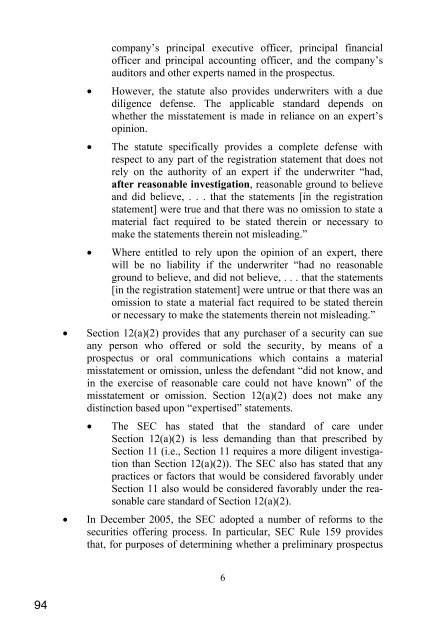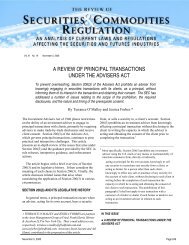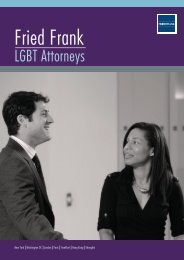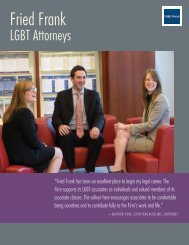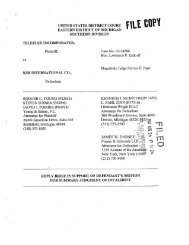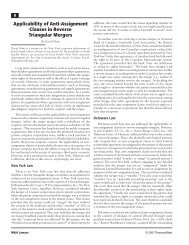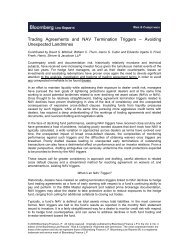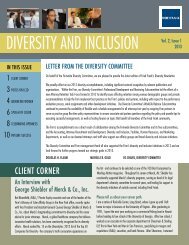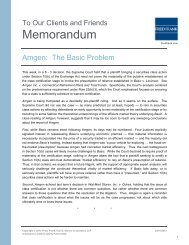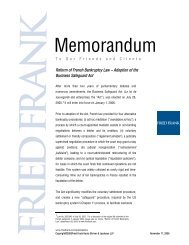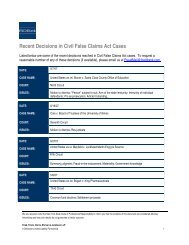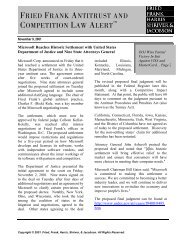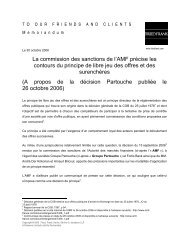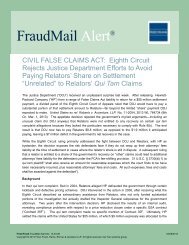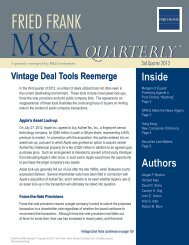The due diligence process from the underwriter's - Fried Frank
The due diligence process from the underwriter's - Fried Frank
The due diligence process from the underwriter's - Fried Frank
You also want an ePaper? Increase the reach of your titles
YUMPU automatically turns print PDFs into web optimized ePapers that Google loves.
company’s principal executive officer, principal financial<br />
officer and principal accounting officer, and <strong>the</strong> company’s<br />
auditors and o<strong>the</strong>r experts named in <strong>the</strong> prospectus.<br />
• However, <strong>the</strong> statute also provides underwriters with a <strong>due</strong><br />
<strong>diligence</strong> defense. <strong>The</strong> applicable standard depends on<br />
whe<strong>the</strong>r <strong>the</strong> misstatement is made in reliance on an expert’s<br />
opinion.<br />
• <strong>The</strong> statute specifically provides a complete defense with<br />
respect to any part of <strong>the</strong> registration statement that does not<br />
rely on <strong>the</strong> authority of an expert if <strong>the</strong> underwriter “had,<br />
after reasonable investigation, reasonable ground to believe<br />
and did believe, . . . that <strong>the</strong> statements [in <strong>the</strong> registration<br />
statement] were true and that <strong>the</strong>re was no omission to state a<br />
material fact required to be stated <strong>the</strong>rein or necessary to<br />
make <strong>the</strong> statements <strong>the</strong>rein not misleading.”<br />
• Where entitled to rely upon <strong>the</strong> opinion of an expert, <strong>the</strong>re<br />
will be no liability if <strong>the</strong> underwriter “had no reasonable<br />
ground to believe, and did not believe, . . . that <strong>the</strong> statements<br />
[in <strong>the</strong> registration statement] were untrue or that <strong>the</strong>re was an<br />
omission to state a material fact required to be stated <strong>the</strong>rein<br />
or necessary to make <strong>the</strong> statements <strong>the</strong>rein not misleading.”<br />
• Section 12(a)(2) provides that any purchaser of a security can sue<br />
any person who offered or sold <strong>the</strong> security, by means of a<br />
prospectus or oral communications which contains a material<br />
misstatement or omission, unless <strong>the</strong> defendant “did not know, and<br />
in <strong>the</strong> exercise of reasonable care could not have known” of <strong>the</strong><br />
misstatement or omission. Section 12(a)(2) does not make any<br />
distinction based upon “expertised” statements.<br />
• <strong>The</strong> SEC has stated that <strong>the</strong> standard of care under<br />
Section 12(a)(2) is less demanding than that prescribed by<br />
Section 11 (i.e., Section 11 requires a more diligent investigation<br />
than Section 12(a)(2)). <strong>The</strong> SEC also has stated that any<br />
practices or factors that would be considered favorably under<br />
Section 11 also would be considered favorably under <strong>the</strong> reasonable<br />
care standard of Section 12(a)(2).<br />
• In December 2005, <strong>the</strong> SEC adopted a number of reforms to <strong>the</strong><br />
securities offering <strong>process</strong>. In particular, SEC Rule 159 provides<br />
that, for purposes of determining whe<strong>the</strong>r a preliminary prospectus<br />
6<br />
94


